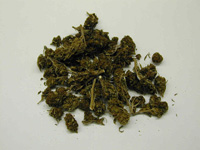Entries Tagged as 'Street Drugs'
 Research shows that some teens are “self medicating” by using street drugs like marijuana to try and overcome feelings of depression. What they do not realize is that marijuana can actually compound the problem.
Research shows that some teens are “self medicating” by using street drugs like marijuana to try and overcome feelings of depression. What they do not realize is that marijuana can actually compound the problem.
A recent report from the White House Office of National Drug Control Policy, shows a staggering two million teens felt depressed at some point during the past year, and depressed teens are more than twice as likely as non-depressed teens to have used marijuana during that same period.
Depressed teens are also almost twice as likely to have used illicit drugs as non-depressed teens. They are also more than twice as likely as their peers to abuse or become dependent on marijuana. Marijuana use is associated with depression, suicidal thoughts, and suicide attempts.
“Marijuana is not the answer. Too many young people are making a bad situation worse by using marijuana in a misguided effort to relieve their symptoms of depression,” said John P. Walters, Director, National Drug Control Policy. “Parents must not dismiss teen moodiness as a passing phase. Look closely at your teen’s behavior because it could be a sign of something more serious.”
More teens use marijuana than all other illicit drugs combined. The new report shows the following:
[Read more →]
Tags: Marijuana Addiction
 Cocaine-related emergency department visits increased by 47 percent from 1999 to 2002.
Cocaine-related emergency department visits increased by 47 percent from 1999 to 2002.
According to a recent announcement from the American Heart Association, when treating a patient with chest pain who has no obvious risks of heart disease, ER doctors should ask if the patient has used the street drug cocaine.
Most cocaine-associated chest pain is not a heart attack. Thus, it is recommended that these patients be monitored in an observation unit for 9 to 12 hours.
Studies indicate that chest pain related to cocaine use tends to show up within three hours of using the drug. But the chemical remnants of cocaine remain in the system for at least 18 hours and can continue to cause problems.
[Read more →]
Tags: Street Drugs
Crystal Darkness is a 30-minute television documentary telling the frightening truth about Meth’s devastating attack on our youth and their families.
The program is targeted for youth and their parents, but the message extends with conviction to an entire community and throughout our nation. If you are not yet aware of the seriousness of the Meth problem in your neighborhood, then the images and stories shared in this program will prove to be both shocking and scary.
Since the original TV program was broadcast in 2007, there is now a campaign across the country to show it on local stations. In 2007 it was shown in Reno, Las Vegas, San Diego and Oregon. In 2008, it is scheduled for March 26th in Sacramento, April 10 in El Paso and New Mexico, and April 15th in Arizona.
In several communities the documentary aired in a “roadblock”, which meant it was broadcast simultaneously on almost all stations in the area. This gives the show tremendous viewership with an impact over a large area. It has been very effective.
[Read more →]
Tags: Street Drugs
Research by a group of scientists studying the effects of heavy marijuana use shows that withdrawal from the use of marijuana is similar to what is experienced by people when they quit smoking cigarettes.
[Read more →]
Tags: Marijuana Addiction
 Smoking a joint is equivalent to 20 cigarettes in terms of lung cancer risk, and scientists have warned of an “epidemic” of lung cancers linked to cannabis (marijuana).
Smoking a joint is equivalent to 20 cigarettes in terms of lung cancer risk, and scientists have warned of an “epidemic” of lung cancers linked to cannabis (marijuana).
In an article published in the European Respiratory Journal, the scientists said cannabis could be expected to harm the airways more than tobacco as its smoke contained twice the level of carcinogens, such as polyaromatic hydrocarbons, compared with tobacco cigarettes.
The method of smoking also increases the risk, since joints are typically smoked without a proper filter and almost to the very tip, which increases the amount of smoke inhaled. The cannabis smoker inhales more deeply and for longer, facilitating the deposition of carcinogens in the airways.
Marijuana addiction is becoming a real problem.
More information on this research:
[Read more →]
Tags: Marijuana Addiction
Recent research showed that prenatal exposure has significant and long-term effects on the developing Central Nervous System, said Dr. Nancy Day. "We know that prenatal exposure to marijuana leads to deficits in mood, aggression, cognitive development, working memory, and, as secondary results, higher rates of substance use, sexual behavior, and academic problems".
[Read more →]
Tags: Marijuana Addiction
Research on the effects of driving under the influence of marijuana concludes that marijuana-induced impairment persists from four to eight hours - long after the subjective effects have worn off. Ninety-four percent of subjects fail roadside sobriety tests 90 minutes after smoking, while 60 percent fail after 150 minutes.
[Read more →]
Tags: Marijuana Addiction
Electrical signals in the brain are sent using chemicals called neurotransmitters. All addictive drugs affect the production, release, or elimination of neurotransmitters. The major Neurotransmitters implicated in addiction are noted below.
Serotonin
Serotonin (5-hydroxytryptamine or 5-HT) is synthesized from dietary tryptophan and its primary function is regulation of sleep and mood. Low levels of serotonin have been associated with mood disorders such as depression.
Medications called specific serotonin reuptake inhibitors (SSRIs), such as Prozac and Zoloft, increase serotonin levels but can be very dangerous. You should consider taking the essential amino acid trytophan instead. Check with a holistic doctor for advice.
Norepinephrine (NE)
NE’s common function is associated with arousal and alertness. It is synthesized from the essential amino acid tyrosine. The levels of NE fluctuate throughout the day and therefore there are periods when we feel more awake and alert, while at other times we are tired and sleepy.
Certain drugs of abuse, such as stimulants or “uppers”, increase alertness and arousal and cause talkativeness, restlessness, and agitation because of their action on NE systems.
Dopamine
Dopamine release gives us the experience of pleasure and therefore causes us to want to repeat the behaviors necessary to acquire the reward in the future.
It’s interesting that amphetamine and cocaine both increase the amount of dopamine. However, cocaine achieves this action by preventing dopamine reuptake, while amphetamine helps to release more dopamine.
So, these drugs with similar effects produce their actions through entirely different processes. In turn, addiction to the two drugs may call for somewhat different types of addiction treatment.
GABA
Gamma aminobutyric acid (GABA) is synthesized from glutamate (an amino acid) and is found in very high concentrations throughout the brain. It is considered an “inhibitory neurotransmitter”. Because GABA has inhibitory effects on neurons, any drug that increases the actions of GABA will decrease general brain activity and can be considered a “downer” or depressant. Depressants include alcohol, sleeping pills such as Ambien, muscle relaxants such as Valium, and barbiturates such as Secobarbital. Some depressants are very powerful and can cause coma or death.
The Most Addictive Drugs
Different drugs have different effects on the neurotransmitters. For instance, cocaine and methamphetamine are much more addicting than THC (marijuana) because they increase dopamine levels more quickly and to a greater extent.
[Read more →]
Tags: Drugs and Brain Disorders · Street Drugs
Researchers have generally known that people with ADHD are more likely than others to smoke cigarettes and abuse alcohol, marijuana, cocaine and other drugs.
[Read more →]
Tags: Drugs and Brain Disorders · Street Drugs
A recent research report published in Thorax - An International Journal of Respiratory Medicine, stated that "one cannabis joint causes a similar degree of lung damage as between 2.5 and five tobacco cigarettes".
[Read more →]
Tags: Marijuana Addiction
 Research shows that some teens are “self medicating” by using street drugs like marijuana to try and overcome feelings of depression. What they do not realize is that marijuana can actually compound the problem.
Research shows that some teens are “self medicating” by using street drugs like marijuana to try and overcome feelings of depression. What they do not realize is that marijuana can actually compound the problem.  Cocaine-related emergency department visits increased by 47 percent from 1999 to 2002.
Cocaine-related emergency department visits increased by 47 percent from 1999 to 2002. Smoking a joint is equivalent to 20 cigarettes in terms of lung cancer risk, and scientists have warned of an “epidemic” of lung cancers linked to cannabis (marijuana).
Smoking a joint is equivalent to 20 cigarettes in terms of lung cancer risk, and scientists have warned of an “epidemic” of lung cancers linked to cannabis (marijuana).